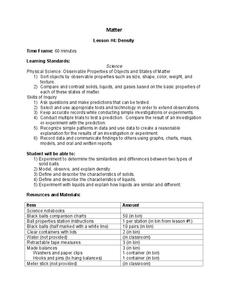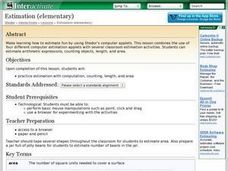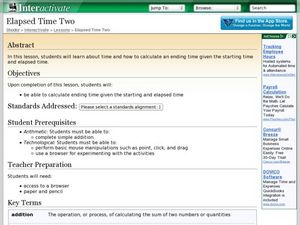Curated OER
Mass-Mass Relationship
Learners investigate mass-mass relationships in the lab. In this mass-mass relationship lesson plan, students mix sodium carbonate with hydrochloric acid to produce sodium chloride, water and carbon dioxide. Learners use the amount of...
Curated OER
Density
Learners predict when an object will float or sink based on comparison of density of the object to the density of the substance in which it is placed. The access a website and sketch the object in the first column of their table and then...
Curated OER
Our Earth
In this Earth's environment worksheet, students complete a crossword puzzle given 35 clues about a variety of topics related to our Earth. Topics include ecosystems, precipitation, biomes, energy transfer, soil, weathering and rocks.
LABScI
Freezing Point Depression: Why Don’t Oceans Freeze?
Can you go ice fishing in the ocean? Learners examine the freezing point of different saltwater solutions. Each solution has a different concentration of salt. By comparing the freezing points graphically, they make conclusions about...
Nuffield Foundation
No Stomach for It: Investigating Antacid Medication
You won't get a stomachache doing an investigative experiment. Pupils simulate the effect of antacids on stomach acid. Obviously, they won't be using real stomach acid; diluted hydrochloric acid serves this purpose.
Utah Education Network (UEN)
Recipe Terminology Hunt
As your young learners develop into cooking enthusiasts, ensure their success in creating their next culinary masterpiece by preparing them to read and understand basic recipe terminology.
Curated OER
Estimation Lesson Plan
Students use four different computer estimation applets with several classroom estimation activities.
Curated OER
Friction Faction
Students create an experiment. In this friction lesson plan, students review the concept of friction and complete a bottle roll activity. Students work in groups to create their own friction experiment.
Curated OER
Models and Algorithms to Solve Multiplication Problems
Students choose the correct strategy to solve multiplication and division. In this algorithm lesson, students use at least two strategies that use properties of operations and estimation. Students also recognize the relationship between...
Curated OER
Density and Buoyancy Lesson Plan
High schoolers investigate why some objects float or sink in water. For this physics lesson, students calculate the density of clay ball using a mathematical equation. They write a complete lab report about the experiment.
Curated OER
Ice Cream Blizzards
Fourth graders explore whether the making of homemade ice cream is a physical change or a chemical change in a lab experiment. Students identify states of matter, describe the physical properties of states, and collect temperature data...
Curated OER
Elapsed Time Two
Students study how to calculate elapsed time. In this elapsed time lesson, they determine how to calculate the ending time of an event when they are given the starting time and the elapsed time. They participate in direct instruction,...
Curated OER
Unit 1 Matter and Energy
Topping this worksheet is a comprehensive collection of notes about phase changes. The phase change graph is displayed, along with formulas for the gas laws, and information relating energy to change of phase. After reviewing these...
Curated OER
IB Chemistry Practice Test
In this chemistry review worksheet, students practice using Avogadro's number, calculating number of moles, and using the gas laws. This worksheet has 39 multiple choice questions.
Curated OER
Water Monitoring Vocabulary
As the title implies, this is a list of vocabulary terms relating to water monitoring. If your ecology class is learning about how to test water quality, this will be an appropriate reference sheet for them. As a bonus, if you live in...
Curated OER
Tick Around the Clock
Learners examine and discuss the differences between clocks they are shown. Using the internet, they research how people used to tell time before clocks. They review what the long and short hand on the clock represent and practice...
Curated OER
Describe Environmental Interrelationships
Students describe environmental interrelationships using list of criteria. They are able to explain organism interaction, based on definitions provided. Also, students can use references and worksheets, to describe effects of pollution...
Curated OER
Volcano Lava Recipe--Experiment and Model
Students build a volcano of clay around a container that is thin and tall. They experiment with two containers with different mixtures in each. Students write out their findings and use strong adjectives to describe how the two mixtures...
Curated OER
Science Crossword Puzzle
Class members read 25 clues about all areas of science, including biology, chemistry, weather, physical science, and insert their answers into a crossword puzzle. There is no word bank and the students would need experience with tough...
Curated OER
Density and Buoyancy
In this density and buoyancy worksheet, students read about the equation to find density and practice finding the density of substances. They read about buoyancy and match 10 terms with their definitions related to density, buoyancy and...
Curated OER
Water Vapor Equilibrium
In this chemistry worksheet, students complete 12 short answer questions and problems on water vapor equilibrium. They calculate equilibrium concentrations of reactants and products.
Curated OER
The Effect of Temperature on Solubility
In this solubility worksheet, students conduct an experiment to see how temperature effects the solubility of salt in water. Students record their data in a chart and then graph the results. Then students complete 2 short answer questions.
Curated OER
Studying the Equilibrium of a Water System
In this equilibrium learning exercise, learners perform a computer simulation on vapor pressure of water at different temperatures to answer 11 problem solving and short answer questions about the topic.
Curated OER
Ooblek
Students demonstrate the three states of matter. In this matter instructional activity, students read Bartholomew and the Ooblek. Students create "ooblek" and discuss what state of matter it is.

























